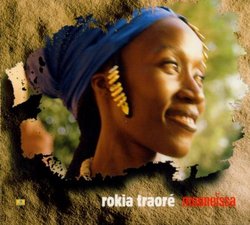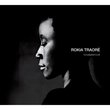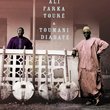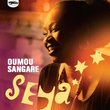| All Artists: Rokia Traore Title: Mouneissa Members Wishing: 3 Total Copies: 0 Label: Indigo France Original Release Date: 1/1/2001 Re-Release Date: 8/14/2001 Album Type: Import Genres: International Music, New Age, Pop Style: Africa Number of Discs: 1 SwapaCD Credits: 1 UPC: 794881324026 |
Search - Rokia Traore :: Mouneissa
 | Rokia Traore Mouneissa Genres: International Music, New Age, Pop
If Rokia Traore singing the title track to Mouneïssa isn't one of the great pleasures of owning a pair of headphones, it certainly comes close. Her pure, angelic voice grabs the Manding material by its soulful lape... more » |
Larger Image |
CD DetailsSynopsis
Amazon.com If Rokia Traore singing the title track to Mouneïssa isn't one of the great pleasures of owning a pair of headphones, it certainly comes close. Her pure, angelic voice grabs the Manding material by its soulful lapels while maintaining a thoughtful note of understatement that's a nice antidote to the declamatory attack of many other Malian vocalists. She's arresting but never overpowering as gliding harmonies couple with the chiming plucked-string arrangement. This reissue of Traore's first album from 1997 shows fewer of the Western vocal touches than on 2000's Wanita, along with soft backing instrumentation that complements her voice like soft raindrops on tender seeds. Acoustic energy propels compositions that draw freely from the Malian griot tradition while adding bold but unobtrusive neo-folkie touches. "Sakanto" pairs the ngoni lute with the balafon wooden marimba, using her healing voice to knit the woody textures together. The fifth cut ("Sabali") surprises by ushering in the first palpable drum on the disc plus an electric bass that creates the tension for her bluesy song about getting wisdom. Though this warm and powerful CD displays Traore at full confidence, it only hints at the gifts she has still to give. --Bob Tarte Similar CDs
|
CD ReviewsThe music that put her on the Malian map rudiger | Hoople, ND | 08/14/2001 (5 out of 5 stars) "Although it's being released in the U.S. more than a year after 2000's "Wanita," this album was Ms. Traoré's first recording, appearing in her home country of Mali in late 1997. Propelled by its popular title song, "Mouneissa" was an almost overnight success there.What Ms. Traoré accomplishes with this album is a virtual reinvention of Malian popular music. She shunned modern instrumentation (except her own acoustic guitar, and an occasional bass guitar) in favor of old-fashioned xylophones, traditional harps and lutes. At the same time she added some outside influences--notably vocal harmonies in her songs' choruses--that remain absent from her Malian contemporaries' music. The result is austere, melodic, and beautiful. This singer is Mali's Traci Chapman, its Ani DiFranco, only way cuter than either of those two.Ms. Traoré's voice has little in common with those of other African women singers. Where griots like Ami Koita charge through a phrase with power and bombast, Rokia caresses the notes delicately. What she lacks in vocal strength she makes up for in finesse. Her voice is at turns high and plaintive, then low and sultry, often in the course of a single song."Mouneissa" features arrangements that are even more spare and simple than those heard on "Wanita." The songs are generally quite accessible even to Western listeners. In my opinion it's a better album than "Wanita," and I hope it garners at least as much attention in America and Europe as it did in West Africa." HER STUNNING FIRST ALBUM Larry L. Looney | Austin, Texas USA | 09/06/2001 (5 out of 5 stars) "Since I wrote such an extended review of Rokia Traore's newest cd, WANITA, I'll keep this one brief. This album, her debut, is every bit as enjoyable as her second. The arrangements are very similar -- acoustic, traditional instruments for the most part, with the addition of acoustic guitar and bass -- and the vocals are absolutely wonderful. Traore sings with such emotion in a completely unaffected, natural style -- she is expressing through her compositions what she feels about life in her homeland of Mali. She's not trying to be a posing superstar -- although she deserves much wider recognition, and I can't imagine her not becoming heard by a much larger world audience.The music on this disc is intrinsically African, with no concessions to Western or European pop culture -- and it, like her second recording, succeeds completely. Heartfelt and unadorned -- and unencumbered -- music like this can be enjoyed and appreciated by anyone whose soul can be touched by art and creativity. No pretentions here -- this is the real thing." The birth of an extraordinary young singer and writer JEAN-MARIE JUIF | BESANCON France | 03/04/2004 (5 out of 5 stars) "The traditionnal music from Mali presents extraordinary similitudes with country blues.Just listen to Ali Farka Toure or Boubacar Traore,and then jump to some Skip James' stuff,like "cherry ball blues" or "hard time killing floor blues",and if you don't think that you're listening to the same kind of music,then please wash your ears.
Miss Rokia Traore ( Traore is a very common name in Mali,just like Smith or Jones in the USA ) is a very young and exceptionnally gifted singer AND composer;24 years old at the time of this session,she wrote the music and lyrics of all these songs.And I can assure you that her lyrics are all but ridiculous.They are just great.The musicians play traditionnal west african instruments,and bass guitar;the music has very strong traditionnal roots.From the very first tune,it will put you into a very relaxed mood,a very soft and warm one;the kind of feeling you can have at midnight in summer,after a torrid afternoon,when the night and warmth become so comfortable and smooth. Now,about Miss Traore's "whiny" voice (as another reviewer,who surely should wash his ears or buy a couple of new ones,said):if Rokia Traore's voice is whiny,then Billie Holiday's voice is whiny too.Or Edith Piaf's;or Jimmy Scott's;or Ali Farka Toure's;or Nina Simone's.Rokia Traore is a young woman,and an exceptionnally beautiful one,and as I had the opportunity to see her on stage,she seems like beeing everything but whiny.Her voice is a very smooth and delicate one,maybe even fragile sometimes (yes,Little Jimmy Scott and Billie Holiday,once again),and this voice reflects perfectly the feelings of her lyrics.If she sang these with Tina Turner's voice,it would be completely ridiculous.Her lyrics are as important as her melodies,and maybe more;and here is the mark of a great writer.Writing good and seductive music is by far much easier than writing solid lyrics.I hope that the american version of this CD includes the english translations of the tunes (the frech issue has lyrics in Malian and french).Because Miss Traore's words are great; great poetry,with references to the ancient african wisdom.Stories of love,magic,stories of oridnary life;the common material the greatest books are made of.The discover of Rokia Traore,a few weeks ago,was a real shock to me;I've not been so impressed by an unknown musician for years. I've always been more sensitive to music than to lyrics;if the music bores me,the lyrics can be the most amazing ones,I'll have troubles to discover the beauty within.And ( as I am mostly a jazz and blues listener ),it is rare to find tunes that are 50% good because of the music and the remaining part because of the words.But it happens sometimes;in tunes like "you go to my head",or Ellington's "lush life","Azalea",in most of Robert Johnson's lyrics,in many Abbey Lincoln's works,and,speaking about french music,in the entire's Georges Brassens' works;maybe Miss Traore would think that it's a disproportionate compliment,but I really think she belongs to the same family of musicians. I hope that she'll become a major artist in the next years;at a time when everybody can record,at a time when so-called "new talents" (who,and I wished to write "which",who are nothing but products) have absolutely nothing to say,real artists like Rokia Traore,because they really make great efforts to feed us with the most delicate and original meals rather than offering us standard products (doing this,she'll surely lose millions of bucks,but this may not be the most important this to her wonderful eyes),at this sad time,such a very great music becomes vital. This is not a very good record of african music;simply,this is not a very good record;here is a terrific bunch of feelings,and freshness,and harmony;here is real beauty;just beauty;just something that has disappeared from our lives." |

 Track Listings (9) - Disc #1
Track Listings (9) - Disc #1

